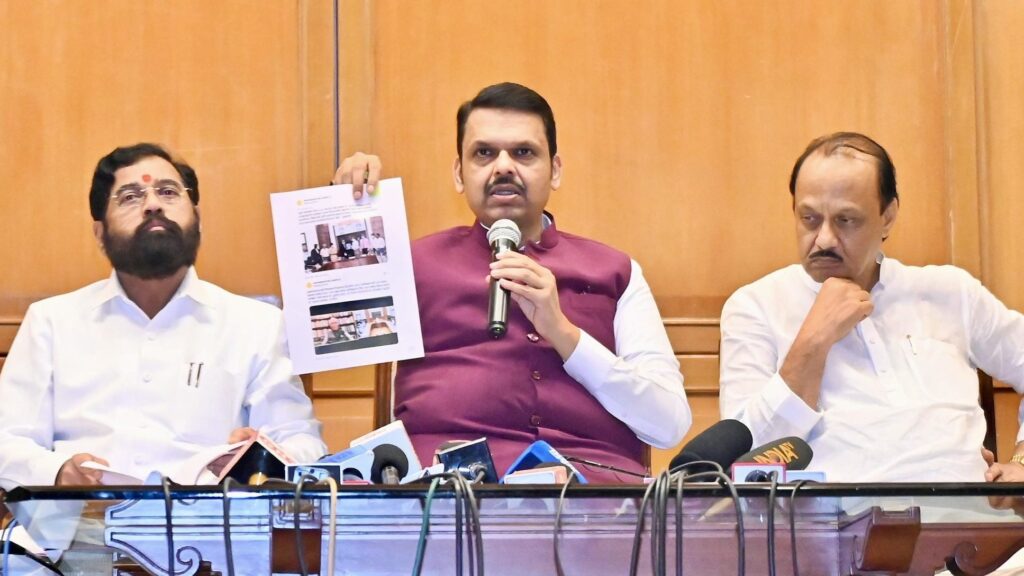The Devendra Fadnavis government’s move to revoke the government resolutions (GRs) on the three-language policy in Maharashtra, inducting Hindi as the third language in primary schools, might have helped it to pre-empt the July 5 protest rally called jointly by the estranged Thackeray cousins – Shiv Sena (UBT) president Uddhav Thackeray and MNS chief Raj Thackeray – but the BJP-led Mahayuti has faced a setback following its flip-flop over the issue.
On Sunday, while revoking the April 16, 2025 and June 17, 2025 GRs, Chief Minister Fadnavis said that the government had neither undermined the Marathi language nor imposed Hindi on students. On the contrary, the CM claimed, the decision to introduce Hindi and English in primary classes was taken by the previous Uddhav-led Maha Vikas Aghadi (MVA) government in 2020-2021.
In state political circles, a key question is doing the rounds as to what was the compulsion behind the Mahayuti government’s decision to issue these GRs despite a perception that instead of simplifying the policy, it has added to the confusion. Both the GRs were issued by the school education ministry headed by Dadasaheb Bhuse who belongs to Deputy CM Eknath Shinde-led Shiv Sena.
The first GR (April 16) made Hindi mandatory as the third language for students from classes 1 to 5. After the Opposition, especially Sena (UBT), went up in arms against it along with other state outfits like the MNS, the government issued a revised GR (June 17), which sought to make Hindi optional as the third language. But its restrictive conditions on the alternatives to Hindi as a third language led to fresh allegations that it was just a “new push for Hindi imposition” by the BJP-led government.
After the government scrapped the GRs, Fadnavis said, “We have always given Marathi first priority. And Hindi was an optional language. We gave students the option to choose any language other than Hindi as a third language,” adding that “we cannot explain things to those who are pretending to be asleep, they are doing politics”.
On his part, Uddhav has maintained that “We are not against Hindi language. Our opposition is to impose Hindi on students at the primary levels,” alleging that “the BJP has always given Marathi a secondary treatment which we oppose tooth and nail”.
Raj said, “The GR cancellation should be permanent. Or else we will not allow the Narendra Jadhav committee to work in Maharashtra.” He also warned that the MNS would not allow the government to push Hindi in primary schools.
While withdrawing the GRs, the Fadnavis government has also constituted a committee led by Narendra Jadhav to review the three-language policy in the state.
Unlike some southern states where widespread anti-Hindi sentiments have run deep historically, Maharashtra has not seen such a pushback against Hindi on a mass scale. This is because the Vidarbha and Marathwada regions have a large Hindi-speaking population. Before the creation of Maharashtra, Vidarbha was part of Central India (now part of Madhya Pradesh) and Marathwada was under the Nizam rule. Hindi thus still holds great significance in these regions.
The Samyukta Maharashtra movement for a Marathi state, led by leaders from diverse parties, had focused on the inclusion of Mumbai (then Bombay) as part of Maharashtra. In the wake of a prolonged agitation during which 106 people were killed in police firing, Maharashtra was formed with Mumbai as its capital on May 1, 1960. The Samyukta Maharashtra movement launched by Keshavrao Jedhe in Pune in 1955 included political stalwarts such as S A Dange, S M Joshi, Narayan Ganesh Gore, Keshav Sitaram Thackeray, Amar Shaikh, Pandurang Bapat, Prasad Atre and Madhu Dandavate, among others.
Although regional parties like the undivided Shiv Sena and the MNS always centred their politics around Marathi Asmita (pride), the electoral dividends of this plank have seemed to be in decline in Mumbai and adjoining districts like Thane, Nashik and Pune over the years, especially in the Lok Sabha and the Assembly polls.
Bal Thackeray, Uddhav’s father, had founded the Shiv Sena in June 1966 to mobilise the Marathi-speaking people against “injustice” to “Marathi manoos (sons of the soil)” in local jobs. Raj, Uddhav’s cousin, who quit the Sena in 2005 after feeling “sidelined” there, floated his own party MNS in 2006, but remained broadly affiliated to the same ideology of Marathi identity and pride.
Despite having been at loggerheads for two decades, Uddhav and Raj have found a common ground for the Marathi cause over the three-language row, which may be detrimental to the prospects of the BJP, the Mahayuti’s lead player, in the upcoming local bodies elections in the state.
The government’s decision to cancel the GRs has given a boost to Thackeray cousins, who have decided to turn their protest rally on July 5 into a victory event. It has also enthused Uddhav’s other MVA allies – the Congress and the Sharad Pawar-led NCP(SP).
State Congress president Harshvardhan Sapkal said, “The government buckled under the Opposition’s pressure. They were scared of the protest rally.” Similar sentiments were echoed by NCP (SP) state chief Jayant Patil, who said, “The government knew the public mood was against it.”
As the monsoon session of the state Legislature got underway Monday, both the Mahayuti and the MVA traded allegations over the language policy.
The BJP has drawn flak even from its allies, Shinde Sena and the Ajit Pawar-led NCP, who have also opposed the move to make Hindi mandatory as a third language.
An NCP insider said, “It was evident from the beginning that the three- language policy was badly handled. Initially, BJP had taken the lead, but it should have done the course correction when both Uddhav and Raj Thackeray raised the alarm in April. It would have saved us the trouble of rolling back two GRs.”
The Shinde Sena also seems to be concerned as it believes the language dispute may have given the Sena (UBT) and the MNS a “new lease of life”.

